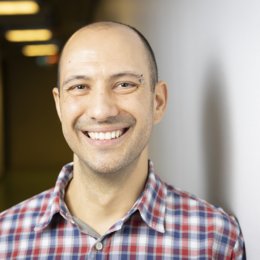Neuromorphic Computing and Artificial Intelligence
I am Hans-Christian Ruiz and I hold a PhD in Machine Learning from the Radboud University, the Netherlands. In 2018, I joined the Nanoelectronics group of the University of Twente as a postdoc to develop training methods for unconventional computing systems. My Sector Plan research focuses on Material Learning.
Background
My background is in theoretical physics and machine learning. I have a Diplom (German MSc equivalent) in physics from the University of Munich (LMU) and I completed my PhD in Machine Learning in July 2018 at the Donders Institute, Radboud University, in Nijmegen. After this, I came to the University of Twente, where I now work as an Assistant Professor.
My research is in the field of “Material Learning”, which is, essentially, the development of machine learning methods for material systems in unconventional/neuromorphic computing. I contribute to the development of efficient hardware for Artificial Intelligence (AI) which is, although very successful in recent years, unsustainable due to its high computational requirements. The core problem of state-of-the-art deep neural networks is their exponential increase in the number of parameters and arithmetic operations to solve complex tasks. This behaviour can only be mitigated with massive computational resources.
To tackle this scalability challenge, I investigate the design and performance of systems with nodes that exhibit high computational capacity and energy efficiency, like dopant network devices. My research aims to realise scalable neuromorphic hardware based on dopant networks to solve complex machine learning problems while being efficient in terms of the number of parameters, operations, and energy. Realising efficient hardware for AI will be transformative by enabling edge computing for AI, meaning that all AI advantages can be exploited locally by smart devices, for example our mobile phones. This is not only energy efficient and ecologically sustainable, but also important for data security and stable, independent smart functionality of devices.
In the years to come
My long-term vision is to develop autonomous learning physical systems. To be truly intelligent, these systems must be able to continuously learn from a constant input-stream of raw data. Learning can be seen as an inherently dynamic process where a system adapts itself to optimise an objective. Therefore, I am interested in a theory of learning from the perspective of physical systems. I aim to develop neuromorphic hardware and training methods that exploit the inherent dynamical characteristics of physical systems to learn and act, just like the brain does. Moreover, autonomous learning must be a self-organising process of the physical system that requires minimally predefined structures but is driven by external signals. To implement such systems in hardware, novel designs that combine different materials must be developed with specific characteristics that address the requirements of autonomous learning.
Education
As of 2020, I am an Assistant Professor in Neuromorphic Computing and Artificial Intelligence (AI) at the Nanoelectronics (NE) group. I am also a lecturer in the MSc course Nanoelectronics, where I teach different approaches to neuromorphic and unconventional computing.
Collaborations
Alongside my collaborations with experimentalists at the NE group, I collaborate with Toyota, IBM Zurich and with researchers at the University of Muenster and the University of Milano. In addition, I am a PI at the Centre for Brain-inspired Nano Systems (BRAINS).

